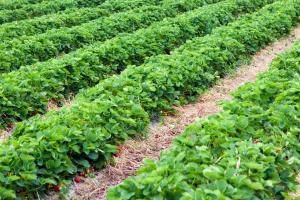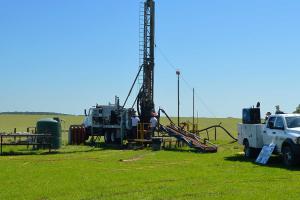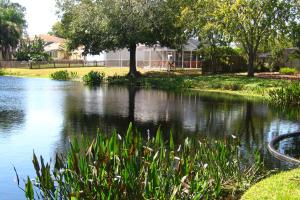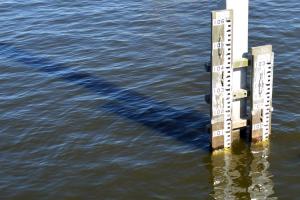Search Content
Displaying results 161 - 180 of 4920
Your Questions Answered
September 2020
Homeowners in Florida know the scorching heat can wreak havoc on lawns and landscapes, which can increase your yard irrigation and your water bill. That’s why Florida-Friendly Landscaping™ is gaining in popularity. The Southwest Florida Water Management District’s Senior Communications Coordinator Katherine Munson explains what Florida-Friendly Landscaping really means and the benefits it provides.…
Springs »
April 2023
Q: What is a spring?
A: A spring occurs when groundwater that is under pressure flows through natural cracks in the aquifer and creates a natural opening in the ground. The pressure causes the water to flow from the aquifer to the earth’s surface. Our groundwater is the result of seasonal rainfall that soaks into the ground and into the aquifer. Springs can occur as an individual vent but more often as…
Springs »
Your Questions Answered
April 2022
Q: What is a spring?
A: A spring occurs when groundwater that is under pressure flows through natural cracks in the aquifer and creates a natural opening in the ground. The pressure causes the water to flow from the aquifer to the earth’s surface. Our groundwater is the result of seasonal rainfall that soaks into the ground and into the aquifer. Springs can occur as an…
Springs »
Your Questions Answered
April 2019
April is Springs Protection Awareness Month, and the Southwest Florida Water Management District is committed to protecting the more than 200 springs within the District. To raise awareness about the importance of these natural treasures, Chief Environmental Scientist Dr. Chris Anastasiou answers some commonly asked questions about our springs.
Q: What is a spring?
A:…
Your Questions AnsweredSeptember 2018Q: Why is the Withlacoochee River experiencing flooding again this year?A: Throughout the spring and summer, above average rainfall has saturated soils and filled wetlands and swamps that are no longer able to store additional rainfall.Q: Is river flooding a normal occurrence?A: …
Your Questions AnsweredJuly 2019The Withlacoochee River is one of the longest and most scenic rivers in the state. As Florida’s third largest river that winds through eight counties, there are many myths about this mighty river. Mark Fulkerson, Ph.D., P.E., Senior Professional Engineer, clarifies some common misconceptions about this 160-mile waterway.Q: Why does the Withlacoochee River run north? Don’t most rivers flow south?A…
District actions regarding issuance or denial of a permit, petition or qualification for exemption, only become closed to future legal challenges if third parties have been properly notified and no third party objects within a specific period.Noticing of Agency ActionNotification of third parties is provided through publication of certain information in a newspaper of general circulation in the county or counties where the proposed activities are to occur. Publication of…
Your Questions Answered
May 2019
The 2019 Atlantic hurricane season begins June 1 and the Southwest Florida Water Management District is preparing for a heightened risk of severe rain events, flooding and storm damage. Jerry Mallams, Operations & Land Management Bureau Chief, explains how the District works to prepare for the storm season by minimizing flood risks throughout the 16-county region.
Q: What…
Springs »
Your Questions Answered
April 2020
April is Springs Protection Awareness Month, and the Southwest Florida Water Management District is committed to protecting the more than 200 springs within the District. To raise awareness about the importance of these natural treasures, Springs Scientist Dr. Madison Trowbridge answers some commonly asked questions about our springs.
Q: What is a spring?
A: A spring occurs when…
There are a variety of different programs that FARMS supports including:Well Back-PluggingThe Well Back-Plugging Program addresses water quality problems that result from agricultural users pumping poor water quality from deep zones of the Upper Floridan aquifer.This program is implemented throughout the SWUCA but primarily focuses on the Shell, Prairie and Joshua Creek watersheds…
Geohydrologic DataGeohydrologic data includes aquifer test data, geohydrologic profile data (water level, slug test, and water quality), stratigraphic data, lithologic logs, geophysical logs, and geohydrologic well site reports and summaries. The majority of geohydrologic data are collected through the Regional Observation and Monitor-well Program (ROMP). More information on the ROMP can be found on the…
Focus Groups
Focus groups are interviews, conducted by a trained moderator, among a small group of respondents. The interview is conducted in an unstructured and natural way where respondents are free to give views from any aspect. The District uses focus groups to acquire feedback regarding attitudes, behaviors and knowledge about water conservation and water quality. Focus groups have also provided valuable feedback for educational and campaign messages.
…
Stormwater SystemsA stormwater system is designed to collect and manage runoff from rainwater. They are specifically designed to help prevent flooding and remove pollutants from the water, and they are required for most new development since the 1980s. When rainwater lands on rooftops, parking lots, streets, driveways and other hard surfaces, the rainfall that doesn’t soak into the ground is called stormwater runoff. Stormwater runoff carries pollutants such as litter…
Historical Groundwater and Surface Water Levels, Rainfall and Evapotranspiration DataLast-Recorded Value App »Find the most recent water level or rainfall value for data collection sites.Daily…
SurveysSurveys are the method for collecting quantitative information on an area of interest. The District uses surveys to acquire information from residents about attitudes, behaviors and knowledge regarding water conservation and water quality.2024 November Weeki Wachee River Campaign Annual Survey Report2024, 438 Respondents During the summers of 2021, 2022, 2023 and 2024 the District led a campaign providing science-based recommendations to users of the…
June 2024Q: What does the District do to prepare for hurricane season?A: Year-round, the District operates 84 water control structures in its 16-county area. These structures assist with flood protection, manage lake water levels and prevent saltwater from flowing up freshwater streams and creeks. To prepare for hurricane season, staff conduct annual hurricane readiness checks of all the District’s structures to ensure they are…
February 2025Q: What is an invasive species?A: An invasive species is an organism that does not naturally occur in a specified geographic area, has been introduced intentionally or unintentionally by humans, and either does or could harm the environment, economy or human health. Invasive species pose a significant threat to Florida's ecosystems by impacting water quality, native habitats and biodiversity. Both aquatic and…
Your Questions Answered
December 2020
Q: What does data collection mean?
A: Data collection is the process of gathering, measuring and analyzing specific information to fix a problem. District geologists perform data collection to help answer scientific and engineering questions in managing water supplies, preserving natural systems and protecting against flooding. The District's Data Collection Bureau…
January 2023
Q: What is vegetation management?
A: Vegetation management is the targeted control of nuisance and invasive exotic vegetation. These operations are conducted on both District-owned lands and on District-managed public waterbodies. This includes the control of both aquatic vegetation, growing in or near water, and terrestrial vegetation, growing on land.
Q: Why is vegetation management important…





